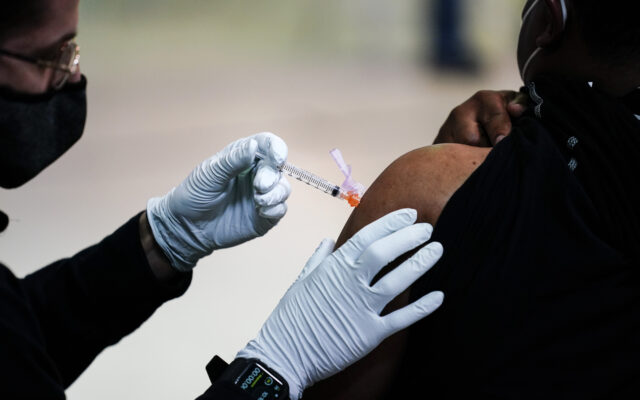
Maine’s childhood vaccination rates have benefited from the elimination of nonmedical exemptions
By Rose Lundy, The Maine Monitor
As the nomination of Robert F. Kennedy Jr. for health secretary heads to a final vote, and the national conversation around vaccines intensifies, it’s worth examining Maine’s childhood vaccination rates.
During the last school year, vaccination rates among kindergartners across Maine were around 97 percent for all four mandatory vaccines. The rates have increased steadily since 2019, when the state passed legislation ending nonmedical exemptions. But some public health advocates worry that vaccine hesitancy could increase under the Trump administration.
Under state law, all kindergarten students in a public or private elementary school must have the following vaccines: diphtheria/pertussis/tetanus (DTaP), poliomyelitis, measles/mumps/rubella (MMR) and varicella (VAR).
In 2019, Maine passed a law that eliminated religious and philosophical exemptions in response to dropping rates of vaccination among schoolchildren. At the time, Maine was one of only 17 states that allowed exemptions if a parent or guardian cited a personal reason, according to reporting from the Bangor Daily News.
Since then, annual vaccination data show that exemption rates have dropped across the board for the four required vaccinations. The exemption rate for the polio vaccine dropped from 5 percent in 2019-20 to 0.6 percent last year.
Before the law went into effect, Maine had one of the highest opt-out rates in the country: It was 5.3 percent in 2017-18 when the national median was 2.2 percent. Last year, Maine’s opt-out rate was 1 percent, compared with the national median of 3.7 percent.
A student who isn’t vaccinated can still be enrolled in school under certain conditions: a parent or guardian provides written assurance the student will be vaccinated within 90 days; a licensed physician, nurse practitioner or physician assistant provides a written statement noting that immunization may be medically inadvisable; or students have an individualized education program that began before September 2021 that included a philosophical or religious exemption.
Last year, 19 schools had kindergarten exemption rates above 5 percent (it’s worth noting that in some of these schools class sizes are quite small).
Ashwood Waldorf School in Rockport had the highest vaccine exemption rate for kindergartners last year at 33 percent — four out of 12 students.
Jeremy Clough, school director, said all four of the exemptions last year were temporary and at least two of the students are now caught up on their vaccines. These temporary medical exemptions often apply to new students who were previously homeschooled and are behind on their vaccinations.
Clough said most of the conversations he’s had with families about vaccines involve explaining the law.
“There’s really no pushback that the families can have because it’s like, ‘Here’s the law and … you either need to be caught up or you need to talk to your health care provider,’” he said.
He said it’s helpful that there’s no gray area in the law. “We’re not doctors,” he said. “I feel like we have no idea what is appropriate medically for anyone. What we know how to do is educate children. So yes, I think it is helpful to have something that’s very clear.”
Jay Corbin, teaching principal of Penobscot Community School, agreed that the law makes conversations more straightforward. Corbin said there wasn’t much resistance from families when the nonmedical exemptions were eliminated, and he doesn’t anticipate more pushback going forward.
Penobscot Community School had among the highest exemption rates last year at 14 percent, but that was due to one exemption out of seven kindergartners. Corbin said the school has historically had high vaccination rates.
The county with the highest exemption rate for kindergartners last year was Piscataquis County at 3.7 percent.
Sue Mackey Andrews, who was a national consultant to health and education departments for 25 years and now is active in public health efforts in Dover-Foxcroft that include childhood vaccine initiatives, said she was surprised the exemption rate wasn’t even higher in her county because Piscataquis has historically had low vaccination rates.
One factor Mackey Andrews pointed to is the lack of access to health care. The closest pediatrician may be in Bangor, which could make it hard to keep kids up-to-date with their vaccines. She said she has also seen the anti-vaccine movement grow in her area due to a “phenomenal” amount of misinformation and fears it could increase under the Trump administration.
In the years since the start of the COVID-19 pandemic, Mackey Andrews said there’s been a “dramatic increase” in homeschooled families in the region.
“I suspect that some of it, at least, is vaccine related,” she said.
Mackey Andrews urges people who have concerns about vaccines to listen to their doctors and ask questions.
“That’s a lifelong, perhaps critical, decision that you’re making,” she said.
This story was originally published by The Maine Monitor, a nonprofit and nonpartisan news organization. To get regular coverage from the Monitor, sign up for a free Monitor newsletter here.